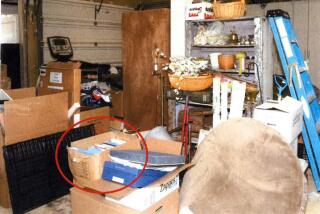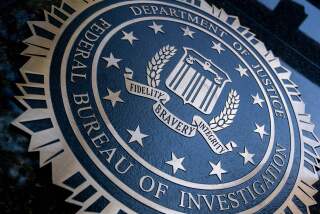FBI Accused of Lying to Search Bombing Suspect’s Cabin
- Share via
SACRAMENTO — Lawyers defending Unabomber suspect Theodore Kaczynski accused FBI agents Friday of lying to convince a judge last year to permit them to search Kaczynski’s Montana cabin.
The charge prompted a prosecutor to angrily reply that agents needed to move quickly to protect public safety.
With Kaczynski seated at the defense table, the former UC Berkeley math professor’s lawyers cited several instances when they say agents either lied or misled U.S. District Judge Charles Lovell of Montana last April when they persuaded him to issue the search warrant.
Defense lawyers Quin Denvir and Judy Clarke made the comments in an effort to convince U.S. District Judge Garland E. Burrell, the Sacramento judge who is presiding over Kaczynski’s case, to throw out the guts of the prosecution’s case--evidence seized from the cabin.
Prosecutors acknowledge there may have been misstatements in the massive search warrant affidavit, and that some passages may have been unclear.
But denying that the agents lied to Lovell or intentionally misled him, Assistant U.S. Atty. Steven Freccero said agents were “obligated by public safety to move quickly.”
“The government was investigating a serial murderer,” Freccero said. “They did not have weeks to sit around [discussing the case].”
Burrell gave no indication of when he might issue a ruling, saying: “I’ll rule as soon as I can. I can’t tell you when that will be.”
Defense lawyers commonly file motions asking judges to suppress evidence. But judges rarely grant such motions. In Kaczynski’s case, a decision to bar evidence from the search warrant could cripple the prosecution’s effort.
Agents found 850 items in the mountainside cabin outside Helena, Mont., including a diary that is said to include incriminating passages and a completed bomb package.
Kaczynski, wearing a white shirt and tweed coat, was attentive during the hearing, turning occasionally to his lawyers and whispering to them. At the end of the session, he made a point of shaking the hands of his lawyers, and smiling and waving to a woman in the courtroom, before marshals led him back to his jail cell.
Kaczynski faces the death penalty in connection with a series of bombings dating back to 1978 that left 23 people injured and three people dead, including two in Sacramento.
Burrell appeared to be considering excluding at least part of the evidence cited in the search warrant affidavit--DNA evidence that prosecutors contend tie Kaczynski to the Unabomber.
Samples of saliva from stamps on three letters sent by Kaczynski and on packages sent by the Unabomber show similar DNA patterns.
Clarke argued that the samples were contaminated, and that more than one person’s DNA was in the saliva. She was assisted by Robert Blasier, a Sacramento attorney who handled DNA arguments for the defense in the O.J. Simpson trials.
“What happens if I agree with the defense and delete the DNA?” Burrell asked prosecutor J. Douglas Wilson.
“In our opinion,” Wilson answered, “probable cause is still overwhelmingly present.”
Clarke also homed in on the FBI’s allegation in the affidavit that there were similarities in Kaczynski’s writings and those of the Unabomber.
The affidavit says that both Kaczynski and the Unabomber, for example, used the term, “Eat your cake and have it, too.”
The FBI contends that most people who use the phrase say, “Have your cake and eat it too.”
To convince Burrell that Kaczynski’s usage was not unusual, the defense went back to the first use of the term, in 194 B.C., in a passage by playwright Titus Maccius Plautus.
More to Read
Sign up for Essential California
The most important California stories and recommendations in your inbox every morning.
You may occasionally receive promotional content from the Los Angeles Times.










